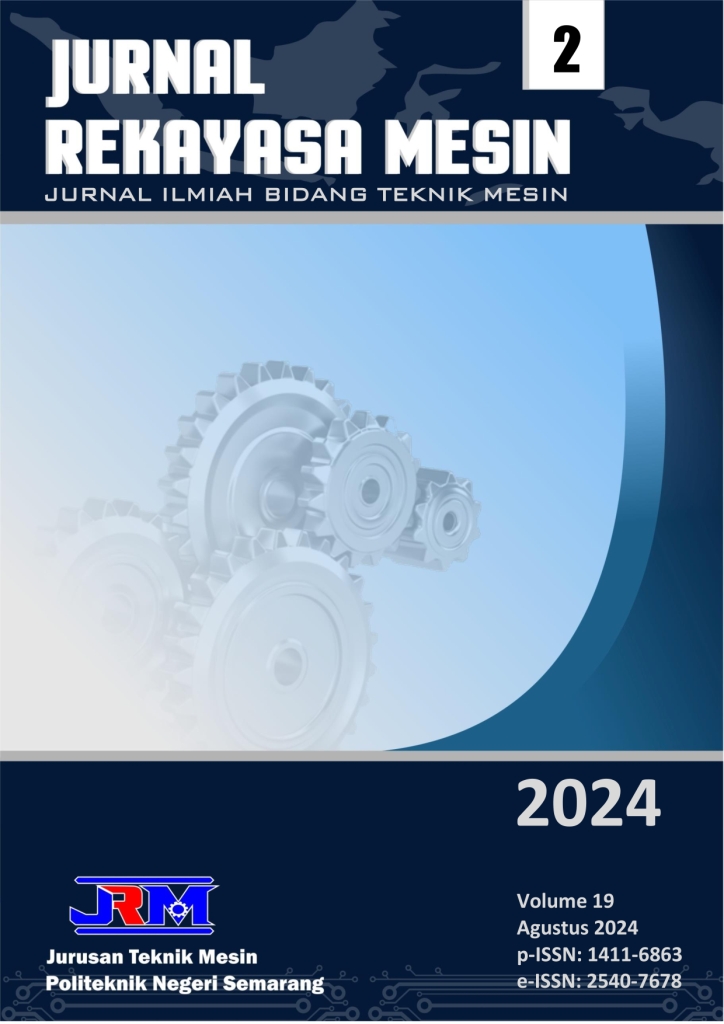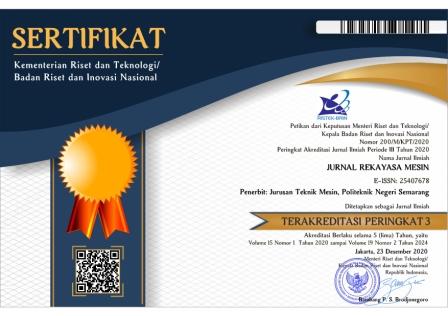PENGUJIAN PROTOTYPE MESIN INJKESI PLASTIC MOLDING MANUAL DOUBLE BARREL KAPASITAS 5 TF
DOI:
https://doi.org/10.32497/jrm.v19i2.5317Keywords:
Temperature, Injection, Molding, Plastic, Polypropylene,Abstract
The plastic injection method is a technique for producing plastic products with different properties and dimensions. The product is made from a combination of materials in the form of particle plastic material, which is used in this study is a thermoplastic polypropylene (PP) type material, this material becomes soft when heated and vice versa becomes hard again when cooled. The conversion of these raw materials is only physical and not chemical conversion, so these raw materials can be recycled if necessary. Plastic injection must meet the requirements such as shape, size and not have defects in the final product injection results such as short shots defects, flashing defects, sink marks defects and flow mark defects and weld lines. The process of injection of plastic products requires optimal parameter settings, namely, heating temperature, melting point, cooling, residence time and injection speed. So that in testing using a manual double barrel plastic injection molding machine with a capacity of 5 tf (5 ton-force = 5000 kg, calming force on molding), it is mandatory to get proper temperature variations and optimal parameter settings, in order to get perfect injection results, in the study The method used is an experimental method consisting of temperature variations of 160 °C, 180 °C and 200 °C which were carried out three times for each temperature variation. After conducting research, we found perfect product results after cleaning, that is, at a temperature test of 180 °C, because only minor flashing defects occurred in the final product. Low and high heater temperature settings, greatly affect the final product.
References
M. Ghilman Badri, M. Darsin, and D. Dwilaksana, “Sifat Mekanik Dan Cacat Penyusutan (Shrinkage) Akibat Variasi Komposisi Campuran Daur Ulang Polyethylene Pada Injection Moulding,” J. ROTOR, vol. 7, no. 1, 2014.
Y. Kristanto and B. Kusharjanta, “Pengaruh Suhu Pemanas Terhadap Shrinkage Pada Proses Injeksi Polypropylene,” Mekanika, vol. 12, no. September, pp. 7”“10, 2013.
N. Noor and B. Triyono, “Perancangan Mesin Injeksi Plastik Portabel,” Pros. 11th Ind. Res. Work. Natl. Semin., pp. 26”“27, 2020.
M. Iman Mujiarto, ST., “SIFAT DAN KARAKTERISTIK MATERIAL PLASTIK DAN BAHAN ADITIF Iman Mujiarto,” Repository.Uin-Suska.Ac.Id, 2023.
I. H. H. Mawardi, “Analisis Kualitas Produk dengan Pengaturan Parameter Temperatur Injeksi Material Plastik Polypropylene (PP) Pada Proses Injection Molding,” Ind. Eng. J., vol. 4, no. 2, pp. 30”“35, 2015.
S. W. Satoto, H. Yanto, P. N. Batam, and B. Centre, “Tekanan Injeksi Moulding Terhadap Cacat Produk,” J. Integr., vol. 10, no. 1, pp. 1”“6, 2018.
T. Womer, “The Evolution of screw design technology for the Injection Molding Process,” Plast. Trends, 2011.
A. I. Ramadhan, E. Diniardi, and M. Daroji, “Analisa Penyusutan Produk Plastik di Proses Injection Molding Menggunakan Media Pendingin Cooling Tower dan Udara dengan Material Polypropylene,” Jrst J. Ris. Sains Dan Teknol., vol. 1, no. 2, p. 65, 2017, doi: 10.30595/jrst.v1i2.1577.
G. A. Dana et al., “ANALISIS PARAMETER MOLD TEMPERATURE PADA TUTUP BOTOL 200 ML TERHADAP CACAT SINK MARK MATERIAL POLYPROPYLENE ( PP ) MENGGUNAKAN SOLIDWORK 2022 Mochammad Arif Irfa ”™ i Abstrak,” pp. 133”“140, 2022.
P. Studi, T. Mesin, F. Teknik, and C. Hsong, “Publikasi Online Mahasiswa Teknik Mesin Pengaruh Variasi Temperatur , Tekanan Dan Waktu Pendinginan Terhadap Waktu Siklus Produksi Dan Berat Produk Pada Proses Injection,” vol. 5, no. 2, pp. 0”“8, 2022.
E. H. Langga, M. Syabani, and R. Wulung, “Pengaruh Suhu Dan Tekanan Injeksi Terhadap Cacat Short Shot Produk Polikarbonat Pada Mesin Injection Molding,” Stud. Kasus Di Pt. Sejong Matrasindo Semarang, vol. 14, pp. 1”“14, 2015.
D. Zulianto, B. Waluyo, and Pramuko, “Cacat Warpage Pada Produk Injetion Molding Berbahan Polyprophylene (PP),” pp. 3”“19, 2015.
Fadhlurrohman, K. Umuran, Affandi, H. Nurdin, and A. Rudi, “Pengaruh suhu cetakan terhadap produk plastik berbahan polyprophylen (PP) pada injection molding,” J. Rekayasa Mater. Manufaktur dan Energi, vol. 5, no. 1, pp. 39”“45, 2022.
A. R. Hakim, “Pengaruh Suhu, Tekanan Dan Waktu Pendinginan Terhadap Cacat Warpage Produk Berbahan Plastik,” J. Dimens., vol. 5, no. 1, p. 128, 2016, doi: 10.33373/dms.v5i1.14.
N. yang Zhao, J. yuan Lian, P. fei Wang, and Z. bin Xu, “Recent progress in minimizing the warpage and shrinkage deformations by the optimization of process parameters in plastic injection molding: a review,” Int. J. Adv. Manuf. Technol., vol. 120, no. 1”“2, pp. 85”“101, 2022, doi: 10.1007/s00170-022-08859-0.
B. W. Febriantoko, A. H. Wibowo, J. Teknik, M. Universitas, and M. Surakarta, “Penyusutan Pada Produk Injeksi Plastik Dengan Mold Tipe Laminated Steel Tooling,” Pros. Semin. Nas. Teknoin, pp. A25”“A29, 2008.
Hisham A. Maddah, “Polypropylene as a Promising Plastic: A Review,” Am. J. Polym. Sci., vol. 6, no. 1, pp. 1”“11, 2016, doi: 10.5923/j.ajps.20160601.01.
B. Purgleitner, D. Viljoen, I. Kühnert, and C. Burgstaller, “Influence of injection molding parameters, melt flow rate, and reinforcing material on the weld-line characteristics of polypropylene,” Polym. Eng. Sci., vol. 63, no. 5, pp. 1551”“1566, 2023, doi: 10.1002/pen.26305.
T. Materne, F. de Buyl, and G. L. Witucki, “Organosilane Technology in Coating Applications : Review and Perspectives,” Dow Corning, vol., no., pp. 1”“16, 2012.
P. Gao, Z. Nieduzak, J. Krantz, M. J. Sobkowicz, and D. Masato, “Analysis of the Embodied Energy of Different Grades of Injection-Molded Polypropylene,” 2024.
Downloads
Published
How to Cite
Issue
Section
License
Copyright of articles that appear in Jurnal Rekayasa Mesin belongs exclusively to Penerbit Jurusan Teknik Mesin Politeknik Negeri Semarang. This copyright covers the rights to reproduce the article, including reprints, electronic reproductions, or any other reproductions of similar nature.







